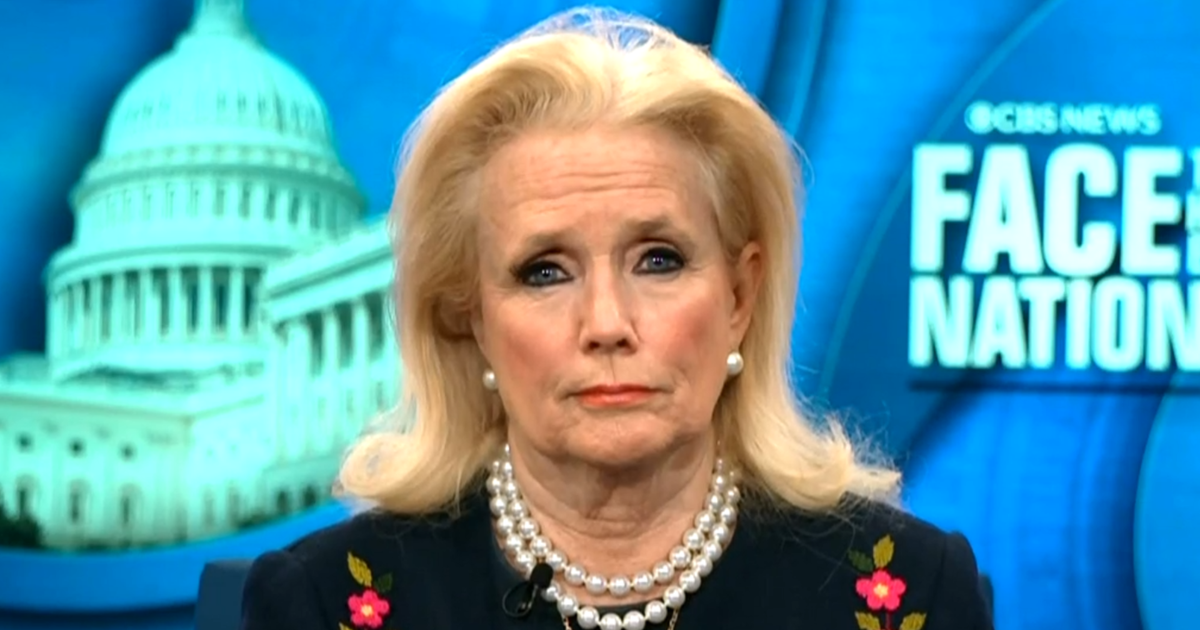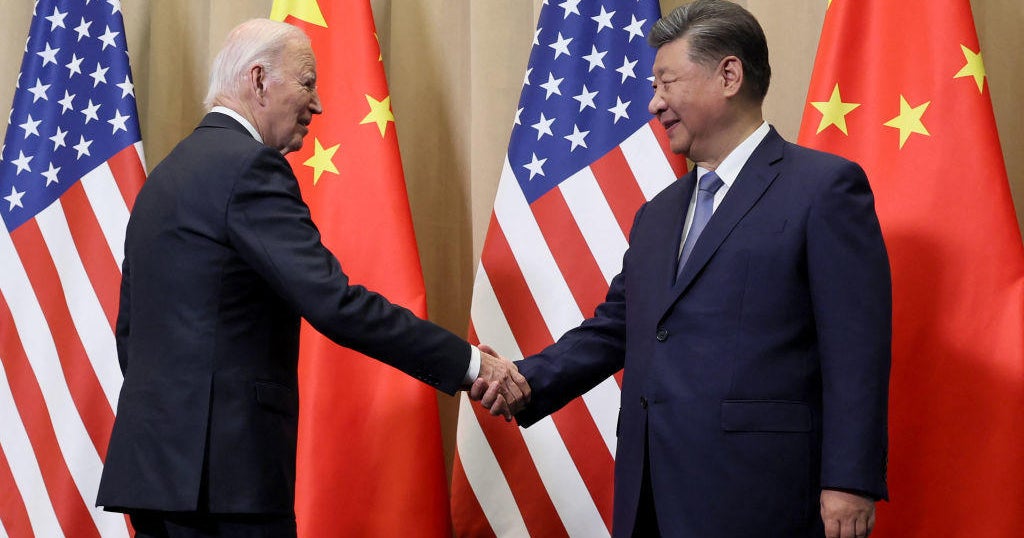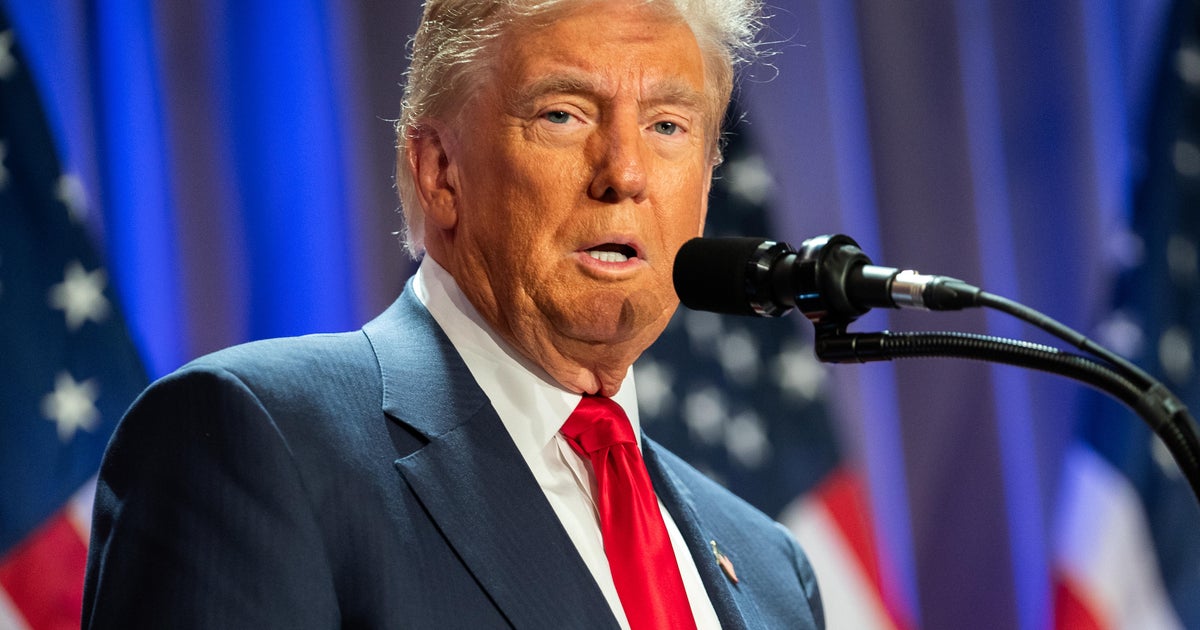CBS News
Transcript: Rep. Debbie Dingell on “Face the Nation,” Feb. 25, 2024

The following is a transcript of an interview with Rep. Debbie Dingell, Democrat of Michigan, that aired on Feb. 25, 2024.
MARGARET BRENNAN: President Biden’s refusal to call for a ceasefire in Gaza has been a source of considerable controversy in Michigan, which holds its primary on Tuesday. The state has a significant Arab and Muslim population. A good number are Democrats. Democratic Congresswoman Debbie Dingell joins us now from Southfield, Michigan. Welcome back to Face the Nation.
REP. DEBBIE DINGELL: Good morning, Margaret. Good to be with you.
MARGARET BRENNAN: Congresswoman I know there is this protest effort underway to vote “uncommitted” among some Democrats to voice upset with the president. Will this damage him in a significant way?
DINGELL: So I wanna say to, I know many of this community, I’ve lived in Dearborn for many years with my husband, and there are two campaigns. One is an abandon Biden campaign, but the other, the major campaign that has made over a hundred thousand calls, we’ll see how many people vote on Tuesday, are trying to make sure the president hears them. They have so many family in Gaza. I cannot tell you how many people I know who have lost grandparents, some parents, aunts and uncles and cousins, families who have lost 20 or 40 members. I- the case work that I’m doing, the people- I don’t sleep at night. When you talk to them about how they don’t have food, how they don’t have any access to healthcare, they’re drinking salt water, and almost out of salt water, which isn’t healthy, the sanitary conditions on the ground. There’s- I mean, one woman, the aunt of somebody, goes to the bathroom once a day. There- a month ago, there was one toilet for every 220 people, one shower for every 15,000 people. It’s a nightmare. And they’re scared for their families and they’re worried. But I also- when we get a ceasefire, they need this ceasefire, then we sit down and, and, and talk. And there are a lot of things that Donald Trump have done who are pretty- which are pretty horrific, and when you go back and review them, we’re gonna have to remind people of what he said.
MARGARET BRENNAN: I understand. And the nuance of what you are saying there, that this is not political, this is personal for a lot of people. On- on that note, we just heard from the Israeli Prime Minister that he is going into southern Gaza whether President Biden likes it or not. You said you’re working to help some of your constituents without family. Do you think the United States is doing enough to get Americans or families of Americans out of harm’s way?
DINGELL: So I’m gonna first say that none of us know what’s going on in all of these negotiations. We know that Bill Burns was over in- the director of the CIA was in Paris. I know members of the National Security Council have been there and I know that the President has directly told the prime minister that he is very concerned and he needs to be very careful. People need to understand that- what is going on in Rafah right now. The population of Gaza is approximately 2.2 million people. 1.5 million of them have been forced into Rafah. We’ve already lost somewhere- you know, we can argue about the numbers, nobody denies that 12,000 children have already died. You just heard the- during that interview that the Doctors Without Borders have talked about 1,000, uh, children who have lost limbs, the number of children that don’t have families, it would be outrageous for further innocent civilians to be killed. I know that the White House is working very closely with a number of other countries to make it clear that we cannot continue this loss of life. And I- I continue to talk to the white house every day, tell them how important it is. And they assure me that the President is very engaged in delivering very direct messages.
MARGARET BRENNAN: But he has not rhetorically called for a ceasefire.
DINGELL: They- he has, in private conversations say he is working towards a temporary ceasefire. You know, I know we need a cease fire, temporary ceasefire. If you get the six week cease fire, then hopefully leads to- we also need the, we need the hostages to be returned–
MARGARET BRENNAN: Understood.
DINGELL: There’s people hurting on both sides. I think that that’s–
MARGARET BRENNAN: Yeah. I wanna talk to you more. I just have to take a commercial break. So let- stick with me, if you would, Congresswoman. We’ll be back with more.
(BREAK)
MARGARET BRENNAN: Welcome back to Face the Nation. We continue our conversation now with Michigan Congresswoman Debbie Dingell. Congresswoman, you’ve been very clear, the humanitarian side of this conflict, in terms of the political impact, was it a mistake for President Biden, when he went to Michigan, not to meet with any members from this particular community?
DINGELL: Look, I- I do believe that he is going to need to do that at some point down the road. This community is pretty angry right now. Uh, look, I get protested. I had a town hall meeting this week and a number of people- and I think I’ve been one of the people that has been the most em- empathetic and has been working this issue really hard. I think he sent his team out. What- when he sent many of his team out, they developed relationships or connected with people that, from both sides, I’ve heard that they’ve got ongoing conversations. And that’s gotta continue. I mean, this is really- look, Michigan’s a purple state.
MARGARET BRENNAN: Yeah.
DINGELL: I wanna make that clear. It’s been a purple state, as long as I’ve been doing presidential elections. This is a very important issue here, but there are gonna be other issues too. This state’s gonna be purple from now until November. And I’ll tell you one more thing, because I am the person that fought 30 years to have a state like Michigan as one of the early primaries. I wanna be talking about this issue now in February, ’cause it will matter in November, and not on October 15th, which has happened too many times in previous presidential elections. That issues that matter in November, aren’t talked early.
MARGARET BRENNAN: Is the concern about reproductive healthcare access enough to cancel out these negative headwinds?
DINGELL: Look, we- Michigan had a- unprecedented turn out two years ago when the issue was on the ballot. I- I’m gonna tell- I’m gonna be blunt. You know me, I am. We gotta get young people, we gotta get women and we gotta go in the union halls. And it’s great that we’ve got the union presidents and the union organizations endorsing, but we’ve gotta go in those union halls and draw the comparison. Remind people about what Donald Trump did and didn’t do, he talked, didn’t deliver, and about what Joe Biden has delivered on. Women turning out is gonna be absolutely critical. And they thought that when they voted on this, on the ballot last year, they were safe. And now we’ve seen what the Alabama court has done in terms of IVF. Now the Republicans are scared to death and all running out and saying they support IVF. You know what? They’ve never been someone who’s tried to get pregnant. They’ve never had to live through all of this. And I think a lot of women are going to be very emotional about their- women’s health decisions should be made between them, their doctor, their faith, and their family and the federal government’s got no business in it.
MARGARET BRENNAN: Congresswoman and dangle. Thank you–
DINGELL: –And state government.
MARGARET BRENNAN: Thank you for being direct, as you said.
CBS News
Mike Tyson says he has “no regrets” after losing boxing match to Jake Paul

Despite losing his boxing match to Jake Paul, Mike Tyson in a social media post Saturday said he had “no regrets” to getting “in ring one last time.”
The boxing legend was defeated by social media star Jake Paul in a highly anticipated fight on Friday night with an age difference of over three decades between the two contenders.
Netflix said Saturday that 60 million households worldwide tuned in to watch the match. The two fighters went eight full rounds, with each round two minutes long. Paul defeated Tyson by unanimous decision and the 27-year-old upset boxer and 58-year-old former heavyweight champion hugged afterward.
Paul was expected to earn about $40 million from the fight, and Tyson was expected to take around $20 million for the fight, according to DraftKings and other online reports.
Getty Images
Tyson said on his social media that “this is one of those situations when you lost but still won. I’m grateful for last night.”
The fight almost didn’t happen after Tyson experienced an ulcer flare-up while on a plane in March. He addressed his illness Saturday, writing that he “almost died in June.” He said he had eight blood transfusions and “lost half my blood and 25lbs in hospital and had to fight to get healthy to fight so I won.”
Tyson retired from boxing in 2005 after a 20-year career. He last fought in a 2020 exhibition match against former four-division world champ Roy Jones Jr.
“To have my children see me stand toe to toe and finish 8 rounds with a talented fighter half my age in front of a packed Dallas Cowboy stadium is an experience that no man has the right to ask for. Thank you,” he said.
Alex Sundby and
contributed to this report.
CBS News
In their final meeting, Xi tells Biden he is “ready to work with a new administration”

In their final meeting, China’s leader Xi Jinping told U.S. President Biden that his nation was “ready to work with a new administration,” as President-elect Donald Trump prepares to take over.
The two leaders gathered Saturday on the sidelines of the annual Asia-Pacific Economic Cooperation summit. Mr. Biden was expected to urge Xi to dissuade North Korea from further deepening its support for Russia’s war on Ukraine. It marked their first in-person meeting since they met in Northern California last November.
Without mentioning Trump’s name, Xi appeared to signal his concern that the incoming president’s protectionist rhetoric on the campaign trail could send the U.S.-China relationship into another valley.
“China is ready to work with a new U.S. administration to maintain communication, expand cooperation and manage differences so as to strive for a steady transition of the China-U.S. relationship for the benefit of the two peoples,” Xi said through an interpreter.
LEAH MILLIS/POOL/AFP via Getty Images
Mr. Biden, meanwhile, spoke in broader brushstrokes about where the relationship has gone and reflected not just on the past four years, but on their long relationship.
“Over the past four years, China-U.S. relations have experienced ups and downs, but with the two of us at the helm, we have also engaged in fruitful dialogues and cooperation, and generally achieved stability,” he said.
Mr. Biden and Xi, with top aides surrounding them, gathered around a long rectangle of tables in an expansive conference room at Lima’s Defines Hotel and Conference Center.
There’s much uncertainty about what lies ahead in the U.S.-China relationship under Trump, who campaigned promising to levy 60% tariffs on Chinese imports.
Bobby Djavaheri, president of Los Angeles-based Yedi Houseware Appliances — which manufactures its products in China — told CBS News in an interview this week that such tariffs “would decimate our business, but not only our business. It would decimate all small businesses that rely on importing.”
Trump has also proposed revoking China’s Most Favored Nation trade status, phasing out all imports of essential goods from China and banning China from buying U.S. farmland.
Already, many American companies, including Nike and eyewear retailer Warby Parker, have been diversifying their sourcing away from China. Shoe brand Steve Madden says it plans to cut imports from China by as much as 45% next year.
White House national security adviser Jake Sullivan said Biden administration officials will advise the Trump team that managing the intense competition with Beijing will likely be the most significant foreign policy challenge they will face.
It’s a big moment for Mr. Biden as he wraps up more than 50 years in politics. He saw his relationship with Xi as among the most consequential on the international stage and put much effort into cultivating that relationship.
Mr. Biden and Xi first got to know each other on travels across the U.S. and China when both were vice presidents, interactions that both have said left a lasting impression.
“For over a decade, you and I have spent many hours together, both here and in China and in between. And I think we’ve spent a long time dealing with these issues,” Mr. Biden said Saturday.
But the last four years have presented a steady stream of difficult moments.
The FBI this week offered new details of a federal investigation into Chinese government efforts to hack into U.S. telecommunications networks. The initial findings have revealed a “broad and significant” cyberespionage campaign aimed at stealing information from Americans who work in government and politics.
U.S. intelligence officials also have assessed China has surged sales to Russia of machine tools, microelectronics and other technology that Moscow is using to produce missiles, tanks, aircraft and other weaponry for use in its war against Ukraine.
And tensions flared last year after Mr. Biden ordered the shooting down of a Chinese spy balloon that traversed the United States.
CBS News
Trump selects Liberty Energy CEO Chris Wright as secretary of Energy

President-elect Donald Trump has selected Chris Wright, a campaign donor and fossil fuel executive, to serve as energy secretary in his upcoming, second administration.
CEO of Denver-based Liberty Energy, Wright is a vocal advocate of oil and gas development, including fracking, a key pillar of Trump’s quest to achieve U.S. “energy dominance” in the global market.
Trump also said in a statement Saturday that Wright will serve on the newly-created National Energy Council, which will be chaired by North Dakota Gov. Doug Burgum, Trump’s selection for secretary of the Interior.
Burgum will oversee a panel that crosses all executive branch agencies involved in energy permitting, production, generation, distribution, regulation and transportation, Trump said in a previous statement.
Wright has been one of the industry’s loudest voices against efforts to fight climate change and could give fossil fuels a boost, including quick action to end a year-long pause on natural gas export approvals by the Biden administration.
Wright also has criticized what he calls a “top-down” approach to climate by liberal and left-wing groups and said the climate movement around the world is “collapsing under its own weight.”
Consideration of Wright to head the administration’s energy department won support from influential conservatives, including oil and gas tycoon Harold Hamm.
Hamm, executive chairman of Oklahoma-based Continental Resources, a major shale oil company, is a longtime Trump supporter and adviser who played a key role on energy issues in Trump’s first term.
Hamm helped organize an event at Trump’s Mar-a-Lago resort in April where Trump reportedly asked industry leaders and lobbyists to donate $1 billion to Trump’s campaign, with the expectation that Trump would curtail environmental regulations if re-elected.
The Energy Department is responsible for advancing energy, environmental and nuclear security of the United States. The agency is in charge of maintaining the country’s nuclear weapons, oversees 17 national research laboratories and approves natural gas exports, as well as ensuring environmental cleanup of the nation’s nuclear weapons complex. It also promotes scientific and technological research.
Republican Sen. John Barrasso, who is expected to become chairman of the Senate Energy and Natural Resources Committee, said Trump promised bold choices for his Cabinet, and Wright’s nomination delivers.
“He’s s an energy innovator who laid the foundation for America’s fracking boom. After four years of America last energy policy, our country is desperate for a secretary (of energy) who understands how important American energy is to our economy and our national security,″ Barrasso said of Wright, adding: “Wright will help ensure America remains committed to an all-of-the-above energy policy that puts American families first.”
Thomas Pyle, president of the American Energy Alliance, a conservative group that supports fossil fuels, said Wright would be “an excellent choice” for Energy secretary. Pyle led Trump’s Energy Department’s transition team in 2016.
Liberty is a major energy industry service provider, with a focus on technology. Wright, who grew up in Colorado, earned undergraduate degree at MIT and did graduate work in electrical engineering at the University of California-Berkeley and MIT. In 1992, he founded Pinnacle Technologies, which helped launch commercial shale gas production through hydraulic fracturing, or fracking.
He later served as chairman of Stroud Energy, an early shale gas producer, before founding Liberty Resources in 2010.





